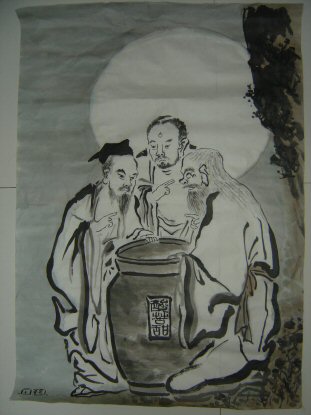There is a famous Taoist painting called “The Vinegar Tasters”, showing together the three greatest prophets of Chinese philosophy: Confucius, the Buddha, and Lao Tzu (the founder of Taoism). Each of them is taking a taste from a great pot of vinegar. Confucius tastes the vinegar and scowls; the Buddha tastes the vinegar and has no expression; Lao Tzu tastes the vinegar and smiles.
![]() The painting is perhaps unfair to the Buddhists, for while Buddhism is sometimes characterized as cultivating a Spock-like lack of emotion, it actually encourages a lack of wrong attachments, i.e. attachments to inappropriate things and feelings; and once these attachments are dropped, what remains is not emotionlessness, but Nirvana, i.e. endless rapture. This is why statues of the Buddha often show him smiling. (The painting may be unfair to the Confucists, too, but I know very little about Confucianism.)
The painting is perhaps unfair to the Buddhists, for while Buddhism is sometimes characterized as cultivating a Spock-like lack of emotion, it actually encourages a lack of wrong attachments, i.e. attachments to inappropriate things and feelings; and once these attachments are dropped, what remains is not emotionlessness, but Nirvana, i.e. endless rapture. This is why statues of the Buddha often show him smiling. (The painting may be unfair to the Confucists, too, but I know very little about Confucianism.)
Nevertheless the Vinegar Tasters is a powerful painting, and it strongly makes the Taoist point that unpleasant experiences need not be avoided or expunged, but can be enjoyed as an integral part of the flow of the world.
What Would Jesus Taste?
I have often wondered what Jesus would be doing in this painting. Would he scowl in anger, as he did at the money-changers in his father’s temple? Would he react with indifference, as when he callously said “You’ll always have the poor, you won’t always have me”? Or would he smile, as when … hmmm… did he ever smile? …
Or would he simply wave his hands and change the vinegar into wine? (My girlfriend, with typical reverence, laughed and said, “You know that Jesus, always ready for a party.”)
I bet Jesus would do exactly that. He often seems to take the easy way out — healing the sick, creating loaves and fish out of nothing, walking on water, bringing people back to life, and otherwise making the life of virtue look simple. Frankly it would be a lot easier to follow Jesus’s example in this world if we also had his supernatural powers.
Quickening the Dead
Comparing the examples of Lazarus and Kisa Gotami is instructive in this regard. In Lazarus’s story, his sister, Martha, asks Jesus to cure him, but Jesus arrives too late; Lazarus is dead. Jesus grieves, but assures Martha that Lazarus will be resurrected. Martha thinks Jesus is referring to the afterlife, and is, understandably enough, ticked off. Then Jesus says “I am the resurrection, and the life: he that believeth in me, though he were dead, yet shall he live: And whosoever liveth and believeth in me shall never die.” Then Jesus brings Lazarus back to life. Very kind of him, of course, but what does Lazarus and his family learn here? Does this help them deal with death? After all, eventually Lazarus will die again, and at that time Jesus won’t be around to help him.
In the story of Kisa Gotami, a grieving woman comes to the Buddha and begs him to bring her son back to life. The Buddha agrees to do so; she simply needs to bring to him a mustard seed from a home in which no one has died. She goes from house to house, looking for the seed, and in each home someone has died. As she faces family after family, and hears each tale of death and loss, she finds herself oddly comforted, and realizes that death is an unavoidable part of life. She goes back to the Buddha, now enlightened, and eventually founds a Buddhist convent.
Buddha 1, Jesus 0? Well, it’s not that simple.
Metaphors of the Natural
First, as Ali pointed out to me, some Biblical scholars suggest that the Lazarus story isn’t so much about dealing with death as it is about Jesus’s willingness to sacrifice himself. The revival of Lazarus is the last straw that causes Jesus’s enemies to decide that he would have to be killed. Jesus knew that by saving Lazarus, he was effectively sacrificing himself; and thus, the revival of Lazarus is symbolic of Jesus dying for everyone’s sins.
But I think another interpretation is possible, too. Jesus knew that Lazarus’s death was temporary, and Jesus’s own death would be temporary, and indeed all deaths are temporary: death is nothing but a door between this life and the next. By bringing Lazarus back to life, Jesus was doing nothing but demonstrating overtly a covert truth: we all come back to life. Similarly, when he turned water into wine, it could be viewed (as C. S. Lewis noted) as a supernatural demonstration of the natural process of water turning into wine through the cultivation of grapes. The abundance of the loaves and fish would be a demonstration of the natural abundance of the Earth.
Jesus’s miracles, perhaps, were not supposed to be showpieces of his compassion and supernatural prowess (though that might have been the primary effects). Instead, they may have been intended to reflect the compassion and natural prowess of the world itself.
So perhaps Jesus would turn the vinegar into wine for the same reason that Lao Tzu smiles when tasting it: when the doors of perception are opened, the vinegar really is wine.

All well and good. But now I can’t help wondering: what would a pagan do?






Leave a comment